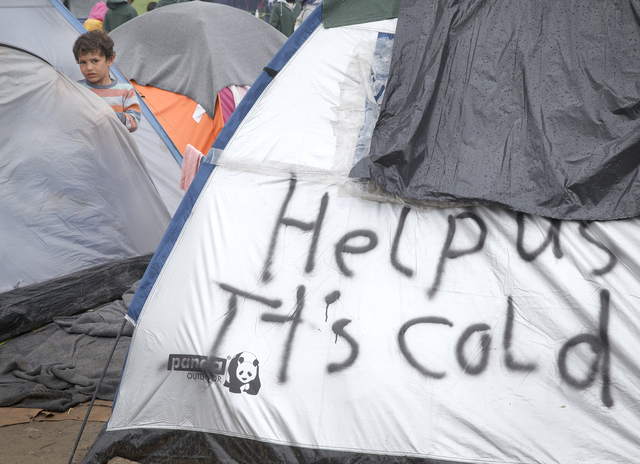Europe effectively shuts its borders, stranding thousands

IDOMENI, Greece — After welcoming hundreds of thousands of people into its heartland, Europe seems to be finally closing its doors.
ADVERTISING
The thousands of people massing at Greece’s northern border are incredulous they won’t be allowed onward to its prosperous countries, but after a year of dithering European leaders seem resolved now to keep all but a select few from going any further.
“This is horrible, unbelievable, unbearable. There is war in my country, and they are closing the border,” said Mahmoud Hassan, a 23-year-old Syrian. “Where are we supposed to go? Please if you can do anything — help us. The situation is very, very terrible.”
A relentless rain Wednesday after an overnight thunderstorm added to the misery in the overflowing camp at Idomeni, which now consists of thousands of small camping tents set up in nearby fields and along railway tracks.
The camp turned into a sodden, muddy mess, with refugees huddling in tents and under ponchos handed out by volunteers to ward off the worst of the wet and cold. Parents covered their children with whatever they could, sometimes resorting to plastic bags. In the brief intervals in the rain, long lines formed in the mud for sandwiches, tea and soup.
A lucky few managed to set up their tents on the train station platform, whose awning provides some shelter, while others slept in disused train carriages.
EU and Turkish leaders agreed at a summit Monday to the broad outlines of a deal that would essentially outsource Europe’s refugee emergency. They said people arriving in Greece having fled war or poverty would be sent back to Turkey unless they apply for asylum. For every migrant sent back, the EU would take in one Syrian refugee, thus trying to prevent the need for people to set out on dangerous sea journeys, often arranged by unscrupulous smugglers.
But Greece has a notoriously slow asylum process, and a crippling six-year financial crisis that has left unemployment at about 25 percent. Few of those stuck in Idomeni could envisage a future in Greece as a viable option.
“Greece is a poor country, for us and for (its) people,” said 17-year-old Ahmed Merza from Syria’s Qamishli, who had been in the camp for eight days. “I don’t know anything. It’s bad news for us, like a bomb.”
Shortly after the summit, countries along the Balkan route decided to allow through only people with valid EU visas and nobody has crossed through the gate in the razor wire-reinforced fence in Idomeni since 6 a.m. Monday.
For the nearly 14,000 people in and around the camp, the news about the border closures was a crushing blow, with many just unable to fathom how Europe could turn away people fleeing war. A few dozen sat on the railway tracks in protest — a frequent occurrence in the camp, where refugees occasionally try to block the passage of freight trains to press their point.
“We’re not here to stay. We are here to pass only,” said Sami Yanes, a 24-year-old information technology student from the Syrian capital of Damascus hoping to continue his studies in Germany.
“We are going to keep protesting and keep doing what we are doing until they know we are human beings and we deserve simple human rights,” he said as he sat on the tracks in the pouring rain after seven nights spent in the camp.
“This is my path,” he said, indicating the railroad leading into Macedonia. “I’m going to stay here until my path is open.”
But the rapidly deteriorating conditions in the camp, where the sound of men, women and children coughing is as ubiquitous as the sight of people trying to start camp fires with sodden logs and branches ripped from nearby trees, was too much for some.
Several buses headed for refugee camps in and around Athens departed from Idomeni on Tuesday and Wednesday, carrying those who could no longer bear the mud, rain, cold and scant food that require hours-long waits in queues.
Some were hesitant, however, to get on buses without knowing what they would find on the other side.
Tariq Mohammed, a 27-year-old from Aleppo travelling with his wife and daughters, aged 5 and 2, was one of them.
“I don’t know what will happen to us,” he said, standing in the rising mud near his tent as water dripped off the hood of his donated green poncho.
Mohammed said both his children had fallen very sick, as had his wife. The doctor had given them antibiotics, but in such conditions he worried about how they would recover their health.
“Last night in the rain, my tent was swimming in water,” he said.
Although most people say they want to go to Germany, which they see as a welcoming country, Mohammed said he would happily go to any European country that would take in his family. Staying in Greece wasn’t an option because there was no work, he said.
“I need to work, to have a life for my children and family,” he said, the desperation visible on his face. “You need life.”
He left Aleppo a month ago, where the conditions were incredibly dangerous. “There are bombs everywhere, war everywhere,” he said, describing a city where children as young as 10 have been recruited to fight and tote guns in the street.
For now, he plans to remain put in the sodden field by the railway tracks in Idomeni.
“I will wait for the border to open,” he said. “I can’t go back to Turkey, can’t go back to Syria. I am here. Where to go?”


